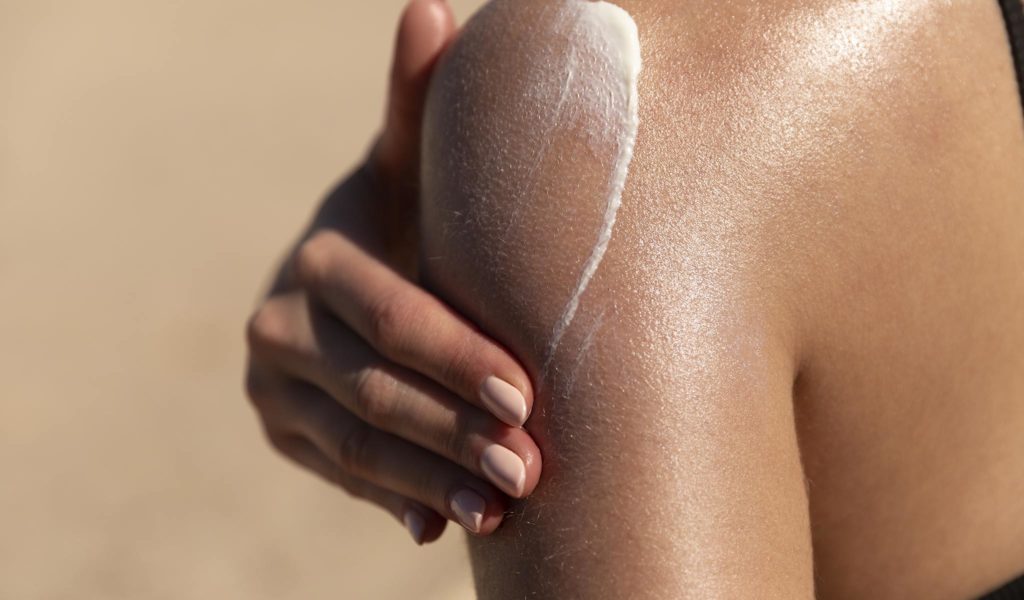 The beauty industry generates more than 120 billion units of packaging globally, and a massive 95% is thrown away after just one use. As part of the wider plastic problem now facing the world, this is a significant contributor to the 8.3 billion metric tons of plastic that has been manufactured over the past 70 years—with only 9% recycled in that time.
The beauty industry generates more than 120 billion units of packaging globally, and a massive 95% is thrown away after just one use. As part of the wider plastic problem now facing the world, this is a significant contributor to the 8.3 billion metric tons of plastic that has been manufactured over the past 70 years—with only 9% recycled in that time.
However, certain “beauty” products are more than simple vanities, and when it comes to sunscreen, there is a real necessity to protect our skin from sun damage. Protecting our skin during the hottest parts of the day is a vital skincare step, especially during outdoor activities such as skiing, gardening, or swimming. Sunscreen protects us from the sun’s harmful rays, but sunscreen packaging contributes to plastic waste unless you opt for more environmentally responsible products.
Sunscreen packaging isn’t the only thing we should watch out for. Sunscreen often contains many chemicals, some of which are toxic to the ocean. When we swim, 25% of sunscreen ingredients are washed off our bodies and left in the water. Oxybenzone and Octinoxate are the two main toxic chemicals found in sunscreen that contribute to the damage of coral reefs and ocean wildlife.

What is a Zero-Waste Sunscreen?
A zero-waste sunscreen aims to eliminate or minimize waste, both from packaging and any harmful chemicals it may contain. To begin with, recyclable or reusable packaging is a core component of a high-quality zero-waste sunscreen, and looking for products that promote transparency in the way they are packaged and processed is a good first step.
In addition to the packaging, a good zero-waste sunscreen should be both oxybenzone and octinoxate free. Ideally, you want to also look for a mineral-based sunscreen containing non-nano zinc. A mineral sunscreen uses minerals rather than harsh toxic chemicals to reflect UVA/UVB rays away from your skin.
Why Consider Switching to A Zero Waste Sunscreen?
Choosing a zero-waste sunscreen means protecting both yourself and the environment, allowing you to enjoy your time in the sun without relying on damaging chemicals or creating unnecessary waste. In fact, there is a broad range of benefits to switching to zero-waste sunscreen, many of which are backed up by hard science.
For example, in 2015, the US passed a law prohibiting the use of microbeads in cosmetics and toiletries. This was certainly a step in the right direction, however, the law only covered products that were classed as rinse-off and not those classed as leave-on. This means microbeads, a significant contributor to microplastics in the ocean, remain a component of many conventional sunscreens, with one study finding as many as 100 trillion plastic particles in one bottle.
Other reasons to switch to zero-waste sunscreens include:
Reduced Chemical Exposure
Conventional sunscreens often contain potentially harmful chemicals, such as oxybenzone and octinoxate, which have been linked to hormone disruption. Zero-waste sunscreens prioritize natural and organic ingredients, minimizing exposure to these chemicals and promoting healthier skincare.
Environmental Protection
Conventional sunscreens contribute to the degradation of marine ecosystems, especially coral reefs. According to numerous research papers published since 2008, oxybenzone can cause coral bleaching, inhibit coral growth, and lead to the eventual death of reefs. By opting for zero-waste sunscreens that use reef-safe ingredients, you can play a part in safeguarding marine life and preserving delicate ecosystems.
Plastic Reduction
Zero-waste sunscreens are designed to minimize or eliminate the use of plastic packaging. Traditional sunscreens typically come in plastic tubes or bottles, contributing to the global plastic waste crisis. By choosing zero-waste alternatives packaged in eco-friendly materials, such as metal tins or compostable materials, you can help reduce plastic pollution and promote a more sustainable future.
Sustainable Ingredients
Zero-waste sunscreens prioritize natural and sustainable ingredients. Many of these products utilize mineral-based filters like zinc oxide and titanium dioxide, which are effective at blocking harmful UV rays without the need for potentially harmful chemicals. These minerals are also less likely to cause skin irritations, making them suitable for sensitive skin.
How Do I Choose an Eco-Friendly Sunscreen?
Choosing an eco-friendly sunscreen is a significant step toward protecting both your skin and the environment, however, it’s important to consider various factors before making a decision. This guide will help you navigate the many options available and choose an eco-friendly sunscreen that aligns with your values and needs.
- Look for non-nano zinc oxide and titanium dioxide — Buy sunscreens that use non-nano zinc oxide and titanium dioxide as active ingredients. These mineral-based filters provide broad-spectrum protection against harmful UVA and UVB rays without being absorbed into the skin. They are also reef-safe, reducing the risk of coral bleaching and damage to marine life.
- Prioritize organic and certified organic ingredients — Choose sunscreens that contain organic and certified organic ingredients. These products are made with materials grown without synthetic pesticides or fertilizers, promoting a healthier and more sustainable approach to skincare. Look for recognizable ingredients like beeswax, coconut oil, shea butter, cocoa butter, and seed oils, which are known for their moisturizing and nourishing properties.
- Consider your skin type and tone — Different sunscreens cater to specific skin types, so consider your skin’s needs when selecting a product. Some sunscreens are formulated for oily or dry skin, while others offer tinted options for various skin tones. Choose a sunscreen that suits your specific skin requirements.
- Go for vegan and cruelty-free options — If you prefer a vegan sunscreen, look for products that explicitly state they are free from animal-derived ingredients and not tested on animals. Vegan sunscreens offer a compassionate choice that aligns with an eco-friendly lifestyle.
- Reduce packaging — Opt for sunscreens that come in compostable or recyclable packaging, such as glass jars or compostable containers. This helps reduce plastic waste and promotes a more sustainable approach to packaging.
- Choose fragrance-free and hypoallergenic options — For those with sensitive skin or allergies, fragrance-free and hypoallergenic sunscreens are ideal choices. These formulations minimize the risk of skin irritation while still providing effective sun protection.
- Research reputable certifications and endorsements — Look for certifications from trusted organizations such as EWG (Environmental Working Group) or B Corp. These certifications ensure that the sunscreen meets specific environmental and ethical standards, providing you with additional confidence in your eco-friendly choice.
To get you started, here is a list of the best zero-waste sunscreens on the market.
Our Selection of 13 Best Zero-Waste Sunscreens
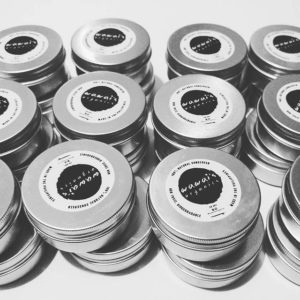
Source: instagram.com
1. Waiwai’s PH Organics
Waiwai’s organics is an ocean-friendly, all-natural eco-friendly sunscreen. This brand uses refillable canisters to support the zero-waste campaign. Waiwai’s sunscreen is also reef-friendly and locally made in the Philippines. To find out more and to make a purchase you can follow them on Instagram or you can check out their Facebook page.
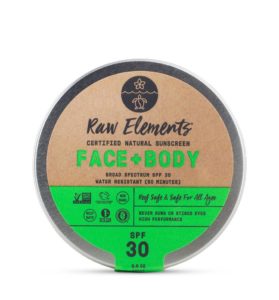
Source: rawelementsusa.com
2. Raw Elements
Raw Elements certified natural sunscreen is one of the best zero-waste sunscreens on the market. Packaged in a recyclable/reusable tin, this sunscreen is also water-resistant for up to 80 minutes.
Raw Elements products are not only pro-zero-waste but also contain vitamins and minerals along with active antioxidants to help protect your skin from pollution and the sun. This sunscreen is also perfect for kids as it’s promoted as gentle on the skin.
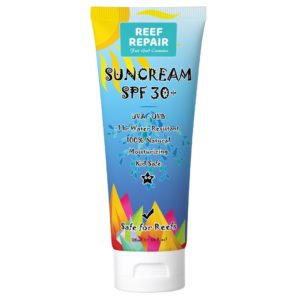
Source: reefrepair.com
3. Repair Reef
Reef repair sunscreen is a wonderful zero-waste face sunscreen option as it moisturizes the skin and protects you from UVA/UVB rays. This sunscreen is all-natural, reef safe, and oxybenzone-free. The packaging is made with #1 Plastic PET and may be recyclable in your recycling program (we recommend checking with your recycling partner to be sure). Reef repair sunscreen is a zero-waste sunscreen spf50 for the ultimate protection during the hottest hours of the day.
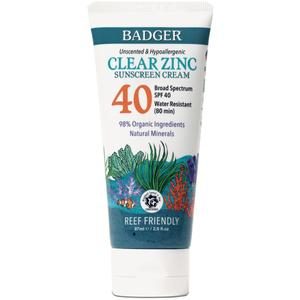
Source: badgerbalm.com
4. Badger
Badger is an eco-friendly family-run company, and its mission is to provide pure and natural products of the highest quality. Badger offers a wide variety of zero-waste sunscreen products for protecting your skin, ranging from zero-waste mineral sunscreens (which means they use zinc oxide – the safest ingredient to use in sunscreen) to bug repellent.
The clear zinc formula means the lotion will absorb easily and not leave you looking pale or chalky. Badger sunscreen is also great because it is 100% coral reef safe, clean, waterless, sustainable, and cruelty-free, while also having nourishing benefits for the skin.
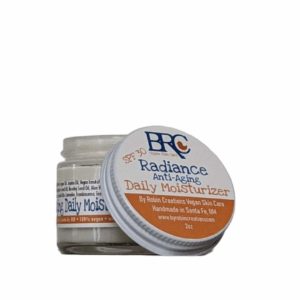
Source: byrobincreations.com
5. ByRobinCreations Vegan Sun lotion
BRC is a vegan skincare brand that sells clothing as well as sunscreens and toothpastes. They sell sunblock for the lips, face, and body at spf30. What’s great about their sunblock is that it is available in a tin, aluminum pouch, or a stick which helps cut down on packaging and reduces waste.
The SPF30 vegan zero-waste sunscreen stick is made with 100% natural ingredients and uses Candelilla wax and non-nano zinc which enables your protection to be waterproof. Their products are all handmade in Santa Fe.
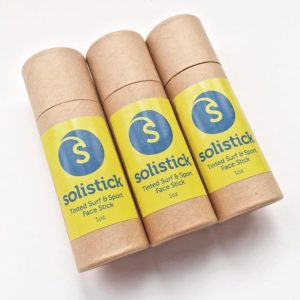
Source: instagram.com
6. Solistick
Solistick is an all-natural zero-waste mineral sunscreen stick for those who want coverage when surfing or hiking. Founded by the beach lifeguard and competitive surfer, Sarah McDonald, the Solistick is a zero-waste tinted sunscreen and is made from the highest quality, vegan, and natural products for the best skin protection.
Solistick comes packaged in a recyclable tube and it’s had great reviews from previous users. You can purchase your first Solistick on etsy.
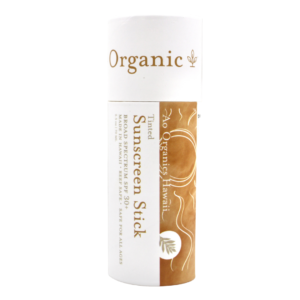
Source: aoorganicshawaii.com
7. AO Organics – Hawaii
AO organics sunscreen is available in liquid, stick, or tin form. The tin packaging is the most zero-waste friendly of their products and contains non-nano zinc to ensure that your skin is protected from the sun in the best way possible.
All ingredients are USDA certified and are chemical-free with no hormone disruptors. The AO Organics zero-waste sunscreen sticks are also eco-friendly. This is a great all-natural sunscreen brand that has the well-being of your skin and the environment at heart.
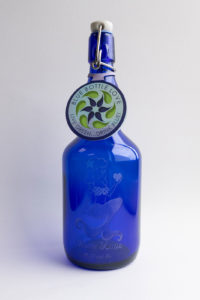
Source: rawlovesunscreen.com
8. Raw Love
Raw Love was founded by Jenna Davis in Maui, Hawaii. Jenna wanted to protect her sensitive skin and tattoos while also being able to dive and teach as a SNUBA instructor. This is a non-toxic zero-waste sunscreen that is safe for everyday use.
Raw Love is reef-friendly, biodegradable, and moisturizes due to its mineral base. Not only is Raw Love a great zero-waste sunscreen but the packing is stylish: A recyclable tin with a mermaid on the front! Jenna also advises that a little goes a long way as Raw Love products do not contain any filler.
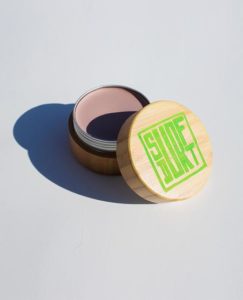
Source: surfdurt.com
9. Surfdurt
Founded by two Californian kids, Surfdurt is the ultimate surfer’s sunscreen. The founders of Surfdurt quickly discovered that 90% of sunscreens used are extremely toxic to the environment and coral reefs. One drop of toxic sunscreen can damage up to 6 Olympic-sized swimming pools worth of coral reef.
Surfdurt’s sunscreen is a non-nano zinc formula mixed with high-quality all-natural ingredients to make sure your skin and the reefs are safe. Their containers come in a range of cool colors which each promote a different cause. For example, if you purchase a green top sunscreen from Surfdurt that money will contribute to the planting of trees. Their containers are also reusable and made from bamboo and lined with aluminum which makes them a great plastic-free sunscreen.
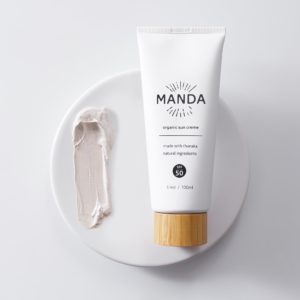
Source: mandanaturals.com
10. MANDA
Manda is an organic low-waste sunscreen. Manda is one of the few skincare brands investing in plant-based packaging to reduce plastic waste, with a sun cream and organic paw-paw salve available in unique bio-plastic tube bottles made from sugar cane.
Thanaka is the most powerful ingredient in Manda products, and it requires less zinc which means less harm to the environment and a low carbon footprint. Additionally, papaya is deemed a superfood and antioxidant for the skin. Overall, Manda is one of the best zero-waste sunscreens on the market and is available in three different shades.
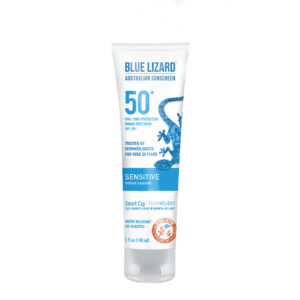
Source: bluelizardsunscreen.com
11. Blue Lizard
Blue Lizard Sunscreen is a reliable and highly effective option for sun protection. It features non-nano zinc oxide as its active ingredient, providing broad-spectrum protection against UVA and UVB rays. The formula contains organic ingredients such as coconut oil and shea butter, which nourish and moisturize the skin. Although it is shipped in plastic packaging, it is 100% recyclable and reef-safe, making it a great choice for those concerned about marine life and coral bleaching.
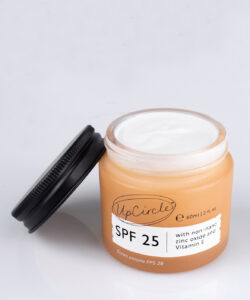
Source: eu.upcirclebeauty.com
12. Upcircle
Upcircle Sunscreen is a unique and eco-friendly option that is shipped in compostable packaging, helping to reduce waste and minimize plastic pollution. It contains non-nano zinc oxide and titanium dioxide, offering reliable broad-spectrum protection against harmful UV rays. The vegan formulation is made with certified organic ingredients, including cocoa butter and green tea, providing moisturizing and antioxidant benefits. Upcircle Sunscreen is suitable for various skin types and tones, catering to a wide range of individuals. With its sustainable packaging and high-quality ingredients, Upcircle Sunscreen is a great choice for those seeking an effective and environmentally conscious sunscreen option.
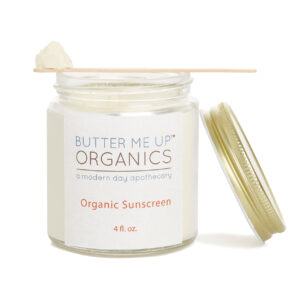
Source: buttermeuporganics.com
13. Butter Me Up
Butter Me Up Sunscreen features non-nano zinc oxide as its active ingredient, ensuring excellent protection against UVA and UVB rays, as well as containing organic ingredients like coconut oil and shea butter which moisturize and hydrate the skin. Packaged in a glass jar, promoting sustainability and reducing plastic waste, Butter Me Up also contains vitamin E, leaving the skin feeling soft, supple, and protected. While suitable for all skin types, its moisturizing properties make it particularly beneficial for dry or sensitive skin.
Subscribe to zerowaste.com for more information on zero-waste living and stay tuned to the blog for more great zero-waste tips and tricks.

